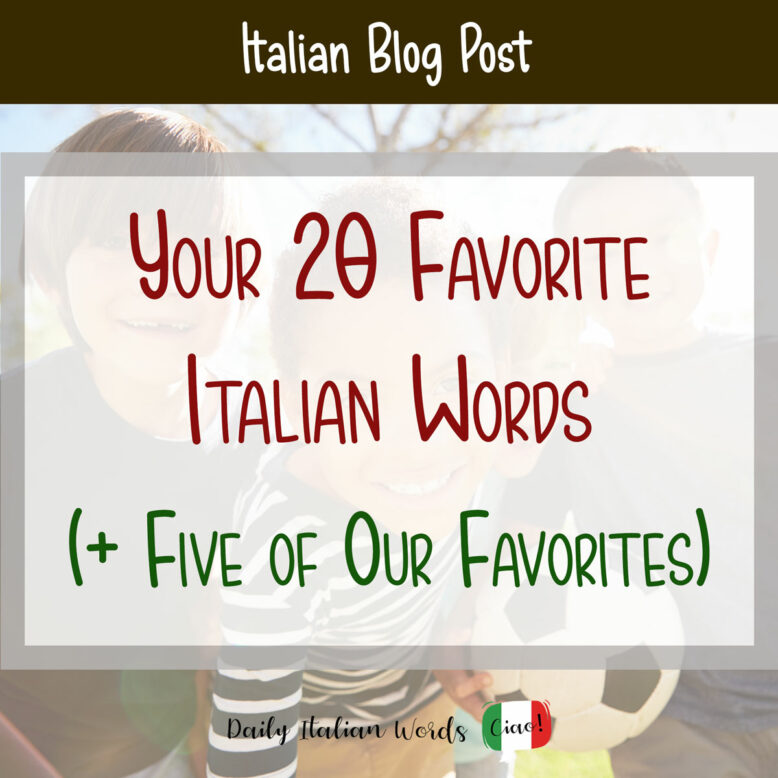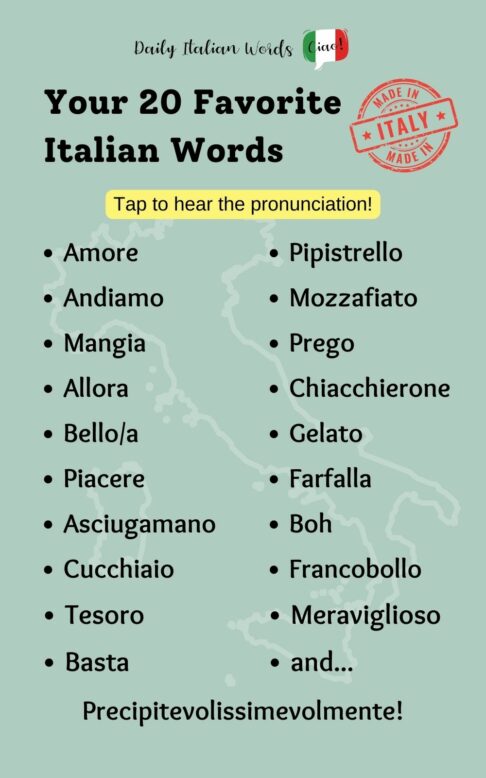We recently conducted a survey in our Facebook group to discover the most popular Italian words among our readers, and over 900 of you responded! While some results, like prego (you’re welcome) and gelato (ice cream), were expected, others proved to be quite surprising.
Below are the top 20 words that you, our readers, consistently voted for. Additionally, we’ve included five of our favorite words that were mentioned a few times, but not enough to make the final list. Enjoy!

The Overall Winner
1. Amore
It’s hardly a shock that amore, the Italian word for love, emerged as the clear winner. Not only does it mean love, but it’s also a very common term of endearment in Italian that can be used towards adults and children alike. I guess love truly conquers all!

The Runners-Up
2. Andiamo
Andiamo is the first-person plural form of andare (to go), meaning “let’s go” or “we go”. We believe this word holds popularity due to its familiarity among our Italian American readers from their childhood.

3. Mangia / Mangiamo
Mangia is an imperative command that translates to “eat!” On the other hand, “mangiamo” means “let’s eat” or “we eat“. It’s highly likely that many of our readers heard these words during their childhood, evoking nostalgic memories of family dinnertime.

Honorable Mention
4. Allora
It’s hard to say why allora, which is a filler word that equates to the English so / well / then / ok, is so popular. It’s possible that tourists often notice it when listening to their Italian guides speak. Moreover, its pleasant sound, with its double L and abundant vowels, could contribute to its appeal. Additionally, I suspect that for many Italian immigrants to America, it was a challenging word to eliminate from their speech, which may have led their children picking it up as well.
5. Bello/a + Bellissimo/a
Bello (masculine) and bella (feminine) both translate to “beautiful.” When you add -issimo/a to the end, you get “very beautiful.” Given their meaning, it’s not surprising that they are so popular. Moreover, bello and bella are also terms of endearment in Italian. It’s quite possible that those who consider these words their favorites were called that as children.
6. Piacere
Piacere means “pleasure,” but it also serves as a greeting equivalent to “nice to meet you.” Its frequent use in conversation, coupled with it being one of the first words learners pick up, makes it an obvious favorite!
7. Asciugamano
Never in a million years would I have expected this word to make the top ten. Asciugamano means towel, and according to our readers, it has a fun and pleasant sound. I also strongly suspect that it’s a word that children of Italian American immigrants would have heard often in their upbringing.
8. Cucchiaio / cucchiaino
Another shocker was the word cucchiaio (spoon) and its diminutive form cucchiaino (teaspoon). As I’ve mentioned repeatedly, this is probably a word that Italian American immigrants kept using in their households even after moving to America. For this reason, it brings back vivid memories of a childhood long gone by.
9. Tesoro
Now we’re back to the kind of words you’d expect to see on a list of favorites. Tesoro means “treasure” and it is commonly used as a term of endearment in Italian, much like the word sweetheart in English.
10. Basta
Basta means “stop” or “enough,” and it’s a word parents often shout at their children when they are misbehaving. Perhaps our readers look back on these tense family moments through rose-colored glasses? 😃
11. Pipistrello
I can’t think of a logical reason why pipistrello (the word for “bat“) is such a favorite, except for the fact that it sounds incredibly cute!
12. Mozzafiato
This word often emerges as a favourite, not primarily due to its sound, but because of its English translation: breathtaking.
13. Prego
Prego, which means “you’re welcome” amongst other things, is another one of those words that learners pick up immediately, hence its popularity!
14. Chiacchierone
This is a playful word in Italian that means “chatterbox.” I would imagine that it’s popular not only because it sounds cute but also because it’s a common nickname for talkative children. The feminine equivalent is chiacchierona.
15. Gelato
Ah, how could this delicious Italian treat not make the list of our readers’ favorite Italian words? In fact, I’m surprised it’s not higher up!
16. Farfalla
Farfalla, which means butterfly, was also a fairly predictable candidate – it sounds beautiful and it refers to something beautiful!
17. Precipitevolissimevolmente
Yes, the longest word in Italian is also one of your favorites. Featuring 26 letters and 13 syllables, it was created by Francesco Moneti (1635-1712), a friar, astronomer, and satirical writer from Cortona. Why not listen to the audio a few times and have a go at pronouncing it?
18. Boh
And from the longest word, we transition to one of the shortest – boh. This simple word means “I don’t know” and can be likened to a verbal shrug of the shoulders. Boh is also one of our favorites, by the way!
19. Francobollo
Francobollo is the word for a postage stamp in Italian. As one of our readers commented, “it’s such a mouthful for such a little thing,” and I do think that’s part of its charm. The repetition of the “o” also gives it a playful sound.
20. Meraviglioso
The final word on this list is a worthy candidate indeed. It is an adjective that means marvellous, though the Italian is used far more than its English equivalent.

Our Top Choices
While we appreciate all the words our readers selected, there are a few that we personally hold a special fondness for, even though they didn’t make it into the top 20.
Tartaruga (#25)
Honestly, who doesn’t love turtles?
Scoiattolo (#34)
The same goes for squirrels!
Albicocca (#35)
The apricot has a lovely name in Italian, and it’s delicious too.
Pomeriggio (#40)
This sounds so much better than afternoon, don’t you think?
Cucciolo (#48)
Cucciolo (cub) is what I call my 3 year old son, so I can’t help but have a soft spot for this word.
Did your favorite Italian word make it onto this list? Let us know in the comment section below!
Heather Broster is a graduate with honours in linguistics from the University of Western Ontario. She is an aspiring polyglot, proficient in English and Italian, as well as Japanese, Welsh, and French to varying degrees of fluency. Originally from Toronto, Heather has resided in various countries, notably Italy for a period of six years. Her primary focus lies in the fields of language acquisition, education, and bilingual instruction.


